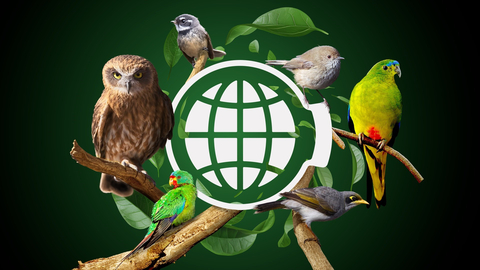Investment supports development of new genomic resources for Australian birds and new tools to accelerate gene editing technologies for birds
DALLAS & MELBOURNE, Australia--BUSINESS WIRE--
Today, the University of Melbourne announces a $1.5M donation from the Colossal Foundation to support Australian avian conservation genomics. The donation will drive the development of an advanced genomics toolkit that will spearhead new approaches to the conservation of bird species in Australia and around the world.
This press release features multimedia. View the full release here: https://www.businesswire.com/news/home/20241120345791/en/

(Graphic: Business Wire)
“Right now, one in eight bird species is at risk of extinction,” said Colossal co-founder and CEO Ben Lamm, who recently launched Colossal’s 501c3 the Colossal Foundation. “As bird species disappear we lose key components of ecosystems, including pollinators, insectivores, and spreaders of seeds, with negative impacts for both human and planetary health. We are excited that the Colossal Foundation can partner with the research team at the University of Melbourne to develop tools to address this global challenge.”
The funding will go to the lab of Professor Andrew Pask, Ph.D and be used to support the sequencing and annotation of high quality reference genomes for several bird species, as well as the development of stem cell and gene editing technologies for birds. These tools will make it possible to identify bird species that are threatened by the loss of genetic diversity and, eventually, to use the tools of genome engineering to improve the chances of helping species to survive.
“Birds currently lag behind their mammalian counterparts in our ability to manipulate their DNA code,” said University of Melbourne’s Professor Andrew Pask, PhD. “These tools will be an important first step toward using gene editing technologies to help birds adapt to their changing habitats, such as by engineering resistance to introduced pathogens or reintroducing lost genetic diversity.”
Although birds are threatened around the world, the frequency and severity of adverse weather events in Australia has been particularly devastating to avian species. For example, 27 bird species were added to the threatened list following a single event - the black summer bush fires of 2019-2020. Rising temperatures have been directly attributable for driving species declines across both warm and cold climates in Australia, showing the broad impacts of climate change across the country. And in conjunction, birds are experiencing increased predation from invasive, non-native species such as cats and foxes.
The donation from the Colossal Foundation will expand the list of high quality reference genomes from across the Avian tree of life, adding key data to global efforts including the Bird10K and EarthBiogenome projects.
“Genomes play a crucial role in conservation by providing the complete blueprint of a species evolutionary history,” said Beth Shapiro, Chief Science Officer at Colossal. “Studying genomes allows us to identify genetic variants that enable species to withstand environmental changes, resist disease, and thrive in specific habitats. Genomes also allow us to identify genetically distinct populations that may require targeted protection efforts, helping prioritize conservation efforts.”
Together with the development of stem cell technologies and gene editing methods across bird species, this genomic information can be used to develop strategies for breeding programs, to reintroduce genetic diversity in endangered populations, and even explore de-extinction possibilities, ultimately restoring lost biodiversity.
“A major goal of the Colossal Foundation is to support the development of biotechnologies that slow biodiversity loss,” said Matt James, Executive Director of the Colossal Foundation. “This partnership with the University of Melbourne is an exciting step towards establishing the technologies necessary to slow or reverse loss in birds. It’s vital work and Andrew’s lab has a great team in place to do this.”
“Our scientists are working hard on innovative solutions to the huge problem of biodiversity loss,” said Professor Moira O’Bryan, Dean of Science at the University of Melbourne. “Conservation science has never been more important, and we are grateful this research is enabled and accelerated by the support of partners like the Colossal Foundation.”
ABOUT COLOSSAL
Colossal was founded by emerging technology and software entrepreneur Ben Lamm and world-renowned geneticist and serial biotech entrepreneur George Church, Ph.D., and is the first to apply CRISPR technology for the purposes of species de-extinction. Colossal creates innovative technologies for species restoration, critically endangered species protection and the repopulation of critical ecosystems that support the continuation of life on Earth. Colossal is accepting humanity's duty to restore Earth to a healthier state, while also solving for the future economies and biological necessities of the human condition through cutting-edge science and technologies. To follow along, please visit: www.colossal.com
WEBSITE & SOCIALS
Website: www.colossal.com
Twitter: https://x.com/colossal
Instagram: https://www.instagram.com/itiscolossal/
LinkedIn: https://www.linkedin.com/company/itiscolossal/
Facebook: https://www.facebook.com/itiscolossal
ABOUT THE UNIVERSITY OF MELBOURNE
As a place of discovery and enquiry, the University of Melbourne’s purpose is to benefit society through the transformative impact of education and research.
Established in 1853, it is one of Australia’s oldest universities and the first in Victoria. As a leading research-intensive university, our dual purposes of education and research are reflected in the experience we offer our students. Encouraging a spirit of innovation, we support our students and researchers with opportunities to translate their research through an entrepreneurial ecosystem, from start-up incubators to major investment funding opportunities.
The University’s commitment to excellence has earned it its place among the world’s best universities, delivering education and research that are global in reach, ambition and impact.
View source version on businesswire.com: https://www.businesswire.com/news/home/20241120345791/en/
Contact details:
COLOSSAL PRESS CONTACTS:
R&CPMK/ [email protected]
UNIVERSITY OF MELBOURNE PRESS CONTACTS:
[email protected] | +61 3 8344 5793

